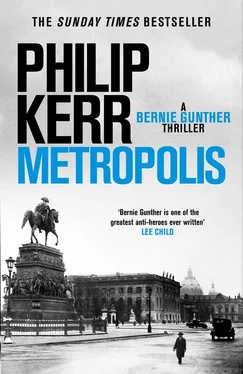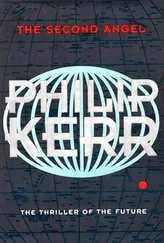‘Can’t argue with that.’
‘But I expect you think I should paint nice landscapes and pictures of pretty smiling girls and kittens. Well, I simply can’t. Not anymore. After the trenches there are no pretty girls, no nice landscapes, and not many kittens. Every time I see a landscape I try to imagine what it would look like if there was an enormous shell hole in the middle of it, a trench in the foreground and a skeleton hanging on the barbed wire. Every time I see a pretty smiling girl I try to imagine what she’d look like if she’d been cut in half by a Vickers machine gun. If I was ever to paint a kitten I’d probably paint two men without noses tearing it apart over the dinner table.’
‘Is there much of a market for that kind of thing?’
‘I don’t do it for the money. We paint that way because we have to paint that way. Yes, that’s right, I’m not the only one. There are plenty of artists who think and paint the same way as I do. Max Beckmann. Otto Dix — yes, you should really see what Dix draws and paints if you think there’s something wrong with me. Some of his work is much more visceral than anything I might paint. But for the record I don’t think either of them is a murderer. In fact, I’m sure of it.’
For a moment he made me feel glad that I was just a stupid policeman — clearly it was what he thought. Still, I was determined to prove him mistaken on that score. Just because I thought I could. But I was probably wrong about that, too, and later on I felt as if I’d been swimming against the wave machine in the indoor pool at Wellenbad.
‘Frankly, I don’t give a damn what you choose to draw and paint, Herr Grosz. That’s entirely your affair. This is Berlin, not Moscow. People can still do more or less what they like here. Like you, I, too, sometimes think that after the war nothing can ever be the same again. But I suppose the major difference between you and me is that I haven’t yet given up on beauty. On optimism. On hope. On a bit of law and order. On a little bit of morality. On Holy Germany, for want of a better phrase.’
Grosz laughed, but his teeth clenched his pipestem tightly. I swam on, still against the tide.
‘Oddly enough I still see the best in women, too. My wife, for example. Until she died I thought she was the most wonderful person I’d ever met. I haven’t changed that opinion. I guess that makes me an incurable romantic. Something incurable, anyway.’
Grosz smiled thinly, while his Pelikan raced across the page. From time to time his shrewd eyes flicked up at me, appraising, measuring, estimating. No one had ever drawn me before and it made me feel strange, as if I were being stripped bare, to my very essence, like one of the corpses in the Hanno showhouse.
‘When a man talks about a wonderful woman,’ he said, ‘usually that just means he likes her because she tries very hard to be like a man. Have you looked at women in this town, lately? Christ, most of them even look like men. These days it’s only the men who look like real women. And I couldn’t give a damn about what’s best in women.’
‘Well, you’ve certainly answered one question. Why you like drawing dead women so much. It’s because you don’t much like women. But I do like the drawing you’ve done of me. Very much. I wonder if you might give it to me.’
Grosz tugged the page out of his sketchbook, added the date, his signature and the location, and swept it across the table as if it had been the check.
‘It’s yours. A gift from me to the Berlin police.’
‘I shall pin it on my wall. Next to Hegel.’ I looked at it again and nodded. ‘But you’ve made me look too young. Too smiley. Like a schoolboy who’s just got his Abitur .’
‘That’s how I see you, sergeant. Young and naïve. It’s certainly how you see yourself. Which surprises me given all you must have been through in four years at the front.’
‘Coming from you, sir, I count that as a great compliment. Makes me feel like that English queer who only gets old in his portrait and loses his soul.’
‘I think you must mean Dorian Gray.’
‘Yes, him. Except that I’ve still got mine. Yes, in future I shall look at this picture and think I’ve been lucky. I’ve come through the worst of it with my soul still intact. And that’s got to be worth something.’
The following day, a Wednesday, was another day off and I’d planned to walk up to Tietz and buy some things for my new office at the Alex to celebrate my promotion to the Commission: a city map for the wall, a decent-size ashtray, a table lighter, a desk set, and a bottle of good Korn and some glasses for the drawer, just in case anyone came visiting; and then to spend a quiet morning in my room reading some police files. But over breakfast that morning — coffee, Tilsit cheese and fresh rolls from the Jewish baker’s shop on Schwerinstrasse — I learned that Frau Weitendorf, her hair even more rigidly Golem-like than normal, which made me think it must be a wig, had other ideas as to how I might spend at least the first part of my morning. Sticking a cigarette into her fat ruddy face and lighting it with a match struck on the pewter novelty monkey’s backside, which often made her smile (although not on this occasion), she came tortuously to the point:
‘I suppose you haven’t seen Herr Rankin,’ she said as she turned down the volume on the Firma Telefunken radio that stood on the sideboard beside a vase of yellow flowers and underneath an Achenbach print of a seascape.
‘Not today.’
‘When was the last time you saw him, Herr Gunther?’
‘I don’t know. Last Friday evening, perhaps? When we all sat down to eat your delicious lung hash.’
‘That was the last time anyone at this table saw him,’ she added ominously.
I looked around at the two others, who were down for breakfast.
‘Is that true?’
Rosa nodded and left the table.
Herr Fischer nodded as well, but felt obliged to add his three pennies’ worth of information, none of which was in the least bit relevant.
‘Yes. It was Friday evening. I remember that because the next day I marched with the communists on Bismarckstrasse, and your lot opened fire as they held up our brass band to allow motor traffic over the intersection at Krumme Strasse. Which was quite uncalled for. But entirely typical of what we’ve come to expect from the Berlin police.’
My lot were the police, of course. I shrugged. ‘Traffic takes precedence over Marx and Engels.’
‘I meant the shooting.’
‘Oh that. Look, all this is beside the point. I thought we were talking about Herr Rankin, not public order.’
‘He’s gone missing,’ said Frau Weitendorf. ‘I’m certain of it.’
‘Are you sure? Perhaps he just went away for a few days. I’m beginning to wish I had.’
‘His suitcase is still here.’
‘You’ve been in his room?’
‘He pays me to clean it. And to change his sheets once a week. When I went in yesterday it was plain he hadn’t been there in days. There were several empty bottles lying on the floor and some blood in his shaving basin.’
‘You’re sure about that?’
‘Go and take a look for yourself.’
We all went upstairs and she unlocked Rankin’s door from a bunch of keys on a pink silk ribbon and ushered me inside.
‘I don’t think we all need to be in here,’ I said to Fischer in particular. ‘No matter what might have happened, I think we still have to respect Rankin’s privacy.’
While I spoke I was eyeing several of the drawings on the wall, which were of naked men in various states of arousal and left nothing to the imagination.
‘Typical copper,’ said Fischer. ‘Always telling people what to do. Just like the Nazis he and his kind serve so enthusiastically. Look, we all live here. And Robert Rankin’s a friend of mine. A good friend. It’s not like he hasn’t invited me in here before. And I think I’m entitled to know if something’s happened to him.’
Читать дальше












